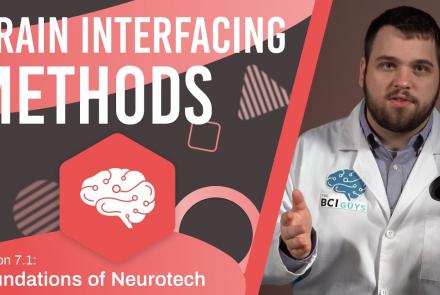Course:
In this module, users will learn about the different types of neurotechnology and how each of them works. This will be done through the metaphor of going to a symphony... in your brain. Like a symphony, brain processes emerge from collections of neural activity. This video encourages us to imagine ourselves moving to different areas in the concert hall to understand where different technologies interface. Once the concert ends, we talk about underlying neural mechanisms and technology that allow researchers and innovators to interact with the brain.
Difficulty level: Beginner
Duration: 10:49
Speaker: : Harrison Canning
Course:
This module addresses how neurotechnology is currently used for medical and non-medical applications, and how it might advance in the future.
Difficulty level: Beginner
Duration: 6:57
Speaker: : Colin Fausnaught
Course:
This module covers a brief history of the neurotechnology industry, bringing the history of brain-computer interfacing to life through engaging skits and stories.
Difficulty level: Beginner
Duration: 12:53
Speaker: : Colin Fausnaught
Course:
This module covers many types of invasive neurotechnology devices/interfaces for the central and peripheral nervous systems. Invasive neurotech devices are crucial, as they often provide the greatest accuracy and long-term use applicability.
Difficulty level: Beginner
Duration: 9:40
Speaker: : Colin Fausnaught
Course:
This module covers many of the types of non-invasive neurotech and neuroimaging devices including electroencephalography (EEG), electromyography (EMG), electroneurography (ENG), magnetoencephalography (MEG), and more.
Difficulty level: Beginner
Duration: 13:36
Speaker: : Harrison Canning
Course:
Neuromodulation refers to devices that influence the firing of neurons which can be useful in many medical applications. This modules covers what neuromodulation is, how it affects the functioning of neurons, and the many forms that these devices take on.
Difficulty level: Beginner
Duration: 12:18
Speaker: : Harrison Canning
Course:
This modules covers neuroprosthetic and cognitive enhancement devices that can help augment our capabilities by enhancing memory, as well as restoring or improving our senses.
Difficulty level: Beginner
Duration: 8:35
Speaker: : Colin Fausnaught
Course:
This module goes over the methods that neurotechnologists use to turn brain data into commands a computer or a machine can understand. We cover data collection, processing, filtering, analysis, how to generate an action in a device, asynchronous BCIs that use population encoding, and synchronous BCIs that use P300, SSVEP, N100, and N400 signals.
Difficulty level: Beginner
Duration: 14:47
Speaker: : Colin Fausnaught
Course:
This module covers the many things that brain-computer interfaces can and will be able to do, including motor neuroprosthetics like prosthetic arms, exosuits, and vehicle control, as well as computer and machine interfacing use-cases.
Difficulty level: Beginner
Duration: 16:39
Speaker: : Harrison Canning
Course:
This module covers how neurotechnology is perceived in media today. We discuss a few specific films and talk about how the perception of neurotechnology changes with our media. Finally, we introduce a few interesting terms related to ethics and address some future issues the technology may cause.
Difficulty level: Beginner
Duration: 12:03
Speaker: : Colin Fausnaught
Course:
What will happen to the mind and our personalities when we start modifying our brains and bodies with technology? What is the mind and how should we think about it? What is a cyborg and what makes them human? Where is the line between these? This video invites us to think about what the future of consciousness might look like.
Difficulty level: Beginner
Duration: 16:06
Speaker: : Harrison Canning
Serving as good refresher, this lesson explains the maths and logic concepts that are important for programmers to understand, including sets, propositional logic, conditional statements, and more.
This compilation is courtesy of freeCodeCamp.
Difficulty level: Beginner
Duration: 1:00:07
Speaker: : Shawn Grooms
This lesson provides a useful refresher which will facilitate the use of Matlab, Octave, and various matrix-manipulation and machine-learning software.
This lesson was created by RootMath.
Difficulty level: Beginner
Duration: 1:21:30
Speaker: :
This lecture discusses the the importance and need for data sharing in clinical neuroscience.
Difficulty level: Intermediate
Duration: 25:22
Speaker: : Thomas Berger
This lecture presents the Medical Informatic Platform's data federation for Traumatic Brain Injury.
Difficulty level: Intermediate
Duration: 25:55
Speaker: : Stefano Finazzi
This lecture gives insights into the Medical Informatics Platform's current and future data privacy model.
Difficulty level: Intermediate
Duration: 17:29
Speaker: : Yannis Ioannidis
This lecture explains the concept of federated analysis in the context of medical data, associated challenges. The lecture also presents an example of hospital federations via the Medical Informatics Platform.
Difficulty level: Intermediate
Duration: 19:15
Speaker: : Yannis Ioannidis
This lecture gives an overview on the European Health Dataspace.
Difficulty level: Intermediate
Duration: 26:33
Speaker: : Licino Kustra Mano
This lecture presents the Medical Informatics Platform's data federation in epilepsy.
Difficulty level: Intermediate
Duration: 27:09
Speaker: : Philippe Ryvlin
This lecture presents the Medical Informatics Platform's data federation in epilepsy.
Difficulty level: Intermediate
Duration: 26:51
Speaker: : Pawel Swieboda
Topics
- Artificial Intelligence (6)
- Philosophy of Science (5)
- Provenance (3)
- protein-protein interactions (1)
- Extracellular signaling (1)
- Animal models (4)
- Assembly 2021 (29)
- (-) Brain-hardware interfaces (14)
- (-) Clinical neuroscience (24)
- International Brain Initiative (2)
- Repositories and science gateways (6)
- Resources (6)
- General neuroscience
(28)
- Phenome (1)
- General neuroinformatics
(5)
- Computational neuroscience (141)
- Statistics (7)
- Computer Science (13)
- Genomics (33)
- Data science
(29)
- Open science (42)
- Project management (7)
- Education (2)
- Publishing (1)
- (-) Neuroethics (28)




















